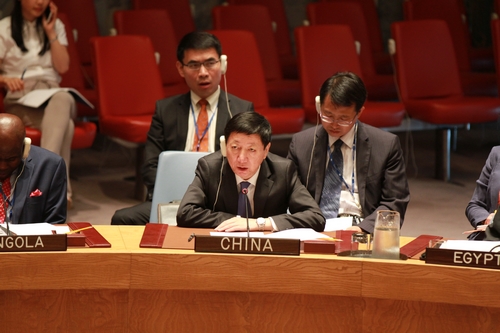| Statement by Ambassador WU Haitao at the Security Council Debate on the Situation in the Lake Chad Basin Region |
| 2016-07-27 10:18 |
|
I would like to thank Under-Secretary-General Jeffrey Feltman and Under-Secretary-General Stephen O’Brien for their briefings. The countries of Central and West Africa have recently further strengthened their cooperation on security, and the overall situation in the region is stable. The countries of the Lake Chad Basin have established the Multinational Joint Task Force and intensified their fight against terrorism, making significant progress in that regard, for which China expresses its appreciation. The security problem and the humanitarian situation in the region remain very serious, however. Repeated terrorist attacks and rampant criminal activities, such as piracy in the Gulf of Guinea, pose a threat to the security and stability of the region. The international community should support the countries of Central and West Africa, including the countries of the Lake Chad Basin region, in the following areas. First, they should support African countries in their counter-terrorism efforts, which constitutes a very important component of international counterterrorism efforts. The international community must actively support and assist the countries of the region in their capacity-building to fight terrorism, enabling the Multinational Joint Task Force to effectively conduct its operations to eliminate the threats to the countries, particularly in the Lake Chad Basin, posed by terrorist organizations and activities. Secondly, there must be greater cooperation with regional and subregional organizations, including the African Union, the Economic Community of West African States and the Lake Chad Basin Commission. The international community must fully respect the leading role played by regional organizations in addressing the region’s problems, and draw on the unique expertise and advantages of those organizations with a view to building synergies and promoting solutions to regional hotspot issues through such methods as dialogue, mediation and good-offices. Thirdly, humanitarian aid should be provided to the region as soon as possible. The international community should adhere to the purposes set forth in the Charter of the United Nations and the fundamental principles of humanity, neutrality and impartiality, as established by relevant General Assembly resolutions, and actively provide humanitarian assistance to the countries concerned based on respect for the sovereignty and territorial integrity of nations, in order to mitigate the food shortage and insecurity facing regional countries. Fourthly, countries of the region must also be provided assistance so that they can achieve development by addressing the root causes of conflict. The international community should also increase its financial assistance to those countries on the basis of respect for their national sovereignty so that they can truly build their capacities to promote economic and social development. China has always actively supported Africa in capacity-building, abiding by its policy of sincerity, good faith and friendship towards Africa, and upholding the right approach to justice and interests. During the Chinese presidency in April, we took the initiative to hold an open debate of the Security Council on combating piracy in the Gulf of Guinea (see S/PV.7675), which resulted in presidential statement S/PRST/2016/4, in which the Council offered a positive response to the aspirations of the regional countries for international cooperation in combating piracy, thereby building an international consensus on fighting piracy in the Gulf of Guinea, offering a new approach to a collective response to the piracy issue. China will continue to implement the outcome of the Johannesburg Summit of the China-Africa Cooperation Forum, and is ready to work with the international community and countries concerned to support the countries of Central and West Africa in their efforts to achieve lasting peace and common prosperity. |
| |||||||||||||
| |||||||||||||
